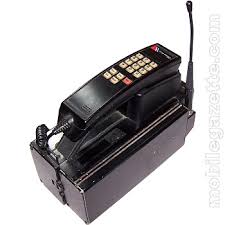Small business owners can be overwhelmed by new trends in technology. We’re puzzled – not because we lack the IQ – but rather our days are bursting with business activities. Finding spare time to research new technology is a challenge. Even more overwhelming is implementing and integrating new technology in a filled-to-capacity enterprise. Rather than risk making a wrong turn (e.g., costly), we do nothing…and risk business survival.
We’ve Come A Long Way!
 My first introduction to technology was my “mobile” phone. Unlike other cell phones of the time that were a permanent fixture in your car, my phone truly was mobile. The “mobile” phone, complete with cinderblock size battery and carrying case, cost $1000.
My first introduction to technology was my “mobile” phone. Unlike other cell phones of the time that were a permanent fixture in your car, my phone truly was mobile. The “mobile” phone, complete with cinderblock size battery and carrying case, cost $1000.
Unlimited data plans were nonexistent so no one was allowed to call my “mobile” phone. Billing was by the minute – and the cost per minute was comparable to a gallon of gas in 2009.
My second memorable expansion into technology came in the form of an IBM computer. Price: $4500, not including software. Even the DOS operating system was an additional fee.
Both technologies, although archaic in comparison to what is at our fingertips today, afforded my business remarkable advancements in performance.
I had arrived!
Today, there is one gadget – the smart phone – that replaces both tools. It goes with us everywhere! We can live in the cloud, work in the cloud, summon Siri to find answers, and have our refrigerators order milk when supplies dwindle.
Technology has indeed come a long way…and continues to march forward at lightening speed.
The Pluses of Small Business Technology
Although you may not be able to imagine a world where a telephone was actually connected to a wall, there are advantages to adopting new technology trends. In general, technology:
- fosters collaboration in real time
- allows us to work anywhere with anyone
- reduces the need for onsite backup
- affords us the ability to sync information across all forms of technology
- cuts email clutter (if we use correctly)
- systematizes work flow processes
- creates a better customer experience
- improves marketing and sales performance
- connects your business with your client when they’re ready
- automates labor-intensive, redundant tasks
- provides practicality when business needs changing bandwidth, allowing you to scale up or back as needed.
Unraveling New Trends in Technology
Productivity is essential to success. At the core of business operations is technology. It is the backbone of every small business. Although change can be stressful, being open and ready for new trends in technology provides a glimpse into opportunities of the future.
Here are a few questions to help make the right investment in the right technology at the right time.
- What is it that your business can do better?
- What is it that your business can do more efficiently?
- What redundancy can be eliminated through the use of technology?
- What distractions can be removed by technology?
- What interruptions can be abolished by technology?
- What labor-intensive tasks are repetitively being paid for can be automated?
- What costs (and clutter) might be eliminated through the use of technology?
Can you imagine a business minus redundancy, distractions, interruptions, repetitive tasks, unnecessary cost, and clutter? Technology combined with advancements in business efficiency and you’re assured to have a competitive edge.
Although it’s not without its challenges, used correctly and judiciously, some of the new trends in technology will help increase the capacity you so desperately desire for your small business.



 As a
As a 
 A lovely green ceramic basin filled with water resides outside my door. The unblemished water tumbling from the bamboo spout is incredibly soothing. My only job, according to my Japanese landscaper, is to keep the water clear and pure.
A lovely green ceramic basin filled with water resides outside my door. The unblemished water tumbling from the bamboo spout is incredibly soothing. My only job, according to my Japanese landscaper, is to keep the water clear and pure.